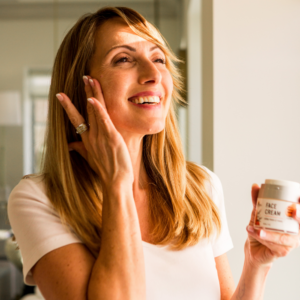Your skin deserves the best care, and choosing the right face cream is essential for a perfect skincare regimen. With so many options available, understanding what to look for in a face cream can make all the difference. This guide will walk you through the key elements, ingredients, and benefits that define an effective face cream, ensuring your skin remains healthy, hydrated, and radiant.

Why Is Face Cream Important in a Skincare Routine?
Face cream plays a vital role in keeping your skin nourished, protected, and balanced. Here’s why it’s a must-have:
- Hydration: Skin loses moisture due to external factors like weather and pollution. A good face cream locks in hydration, preventing dryness and flakiness.
- Protection: Many face creams include antioxidants and SPF to shield the skin from harmful UV rays and environmental stressors.
- Repair: Ingredients like retinol and peptides in face creams can repair damaged skin and reduce signs of aging.
- Balance: Whether your skin is oily, dry, or combination, the right face cream maintains your skin’s natural balance.
Essential Ingredients to Look for in a Face Cream
Understanding the ingredients in your face cream can help you make informed choices. Here are some must-have ingredients based on your skin needs:
For Hydration
- Hyaluronic Acid: A powerhouse for retaining moisture, keeping skin plump and smooth.
- Glycerin: Attracts moisture to the skin and helps improve its barrier function.
- Ceramides: Strengthen the skin’s natural barrier to lock in moisture.
For Anti-Aging
- Retinol: Promotes cell turnover and reduces fine lines and wrinkles.
- Peptides: Stimulate collagen production, improving elasticity and firmness.
- Vitamin C: A potent antioxidant that brightens skin and reduces dark spots.
For Skin Repair
- Niacinamide: Calms inflammation, reduces redness, and strengthens the skin barrier.
- Aloe Vera: Soothes and heals irritated skin.
- Allantoin: Encourages cell regeneration and soothes sensitive skin.
For Sun Protection
- SPF (Broad-Spectrum): Essential for protecting your skin from harmful UVA and UVB rays.
- Zinc Oxide or Titanium Dioxide: Mineral-based sunscreens that are gentle on sensitive skin.
How to Choose the Right Face Cream for Your Skin Type
Selecting a face cream tailored to your skin type ensures maximum benefits.
For Dry Skin
Look for rich, creamy formulations with intense moisturizing ingredients like shea butter, ceramides, and glycerin. Avoid alcohol-based products, as they can strip away natural oils.
For Oily Skin
Choose lightweight, non-comedogenic creams that won’t clog pores. Ingredients like niacinamide and hyaluronic acid help hydrate without making skin greasy.
For Combination Skin
Opt for a balanced formula that provides hydration without overloading oily areas. Gel-based creams often work well for combination skin.
For Sensitive Skin
Look for hypoallergenic and fragrance-free products with soothing ingredients like aloe vera, allantoin, and chamomile. Avoid products with alcohol or harsh chemicals.
For Mature Skin
Anti-aging creams with retinol, peptides, and antioxidants are ideal for mature skin. Hydrating ingredients like hyaluronic acid can also keep the skin plump and youthful.
Tips for Incorporating Face Cream into Your Skincare Regimen
Maximizing the benefits of your face cream involves more than just applying it. Here are some tips:
Cleanse Before Application
Always apply face cream to clean skin. Cleansing removes dirt, oil, and makeup, allowing the cream to penetrate effectively.
Use a Toner
A toner helps balance your skin’s pH and prepares it for better absorption of the cream.
Apply on Damp Skin
Applying cream to slightly damp skin helps lock in extra moisture, boosting hydration.
Don’t Forget Your Neck
The neck is often overlooked but is just as prone to dryness and aging as the face. Apply face cream evenly across the neck and décolletage.
Layer Correctly
If you use serums or treatments, apply them before your face cream to allow active ingredients to penetrate the skin.
The Role of Face Cream in Day and Night Skincare
Your skin’s needs differ during the day and night, and so should your face cream.
Day Creams
Day creams often include SPF and antioxidants to protect against UV rays and environmental pollutants. They are typically lighter in texture to layer well under makeup.
Night Creams
Night creams are richer and focus on repair and rejuvenation. They often contain ingredients like retinol and peptides to enhance cell renewal while you sleep.
Common Mistakes to Avoid
To get the most out of your face cream, steer clear of these common mistakes:
- Using Too Much Product: A pea-sized amount is usually sufficient for the face and neck.
- Skipping Patch Tests: Always test a new product on a small area to avoid adverse reactions.
- Ignoring Seasonal Changes: Adjust your face cream to match seasonal needs—lighter creams for summer and richer ones for winter.
- Overloading Products: Avoid layering too many products, as this can clog pores and reduce effectiveness.
Conclusion
Face creams are indispensable in a perfect skincare regimen, providing hydration, protection, and nourishment to your skin. By understanding your skin type and choosing creams with the right ingredients, you can create a skincare routine that leaves your skin healthy and glowing. Incorporate these must-haves into your daily routine to achieve and maintain radiant skin for years to come.
